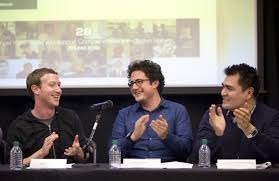This past Thursday night, the headquarters of Dropbox at 185 Berry Street in San Francisco was packed for a discussion, “Can Tech Rebuild the Middle Class and the American Dream”. The discussion was hosted by FWD.us, as part of the group’s focus on the technology sector’s impact on employment and the emerging economy.
FWD.us is best known for its efforts the past few years regarding immigration. However, it also has set itself a broader economic mission. According to the founder and president of FWD.us, Mr. Joe Green, this mission is no less than “ensuring the inclusiveness of the knowledge economy in order to preserve and expand the American Dream”. Mr. Green is a native of California, and after college at Harvard, came back to California to be active in tech start-ups (he was a roommate of Mr. Mark Zuckerberg at Harvard), and be active as well in our state and national policy debates. In a few years, Mr. Green has been the founder of the online campaigning platform Causes.com (with Sean Parker) and several business enterprises.
 Press reports of the Thursday event focused on the recent protests of tech companies in San Francisco: blocking of Google buses, demonstrations at tech companies against rising housing costs. But these protests are merely the side shows, carnival acts, distractions. They are the updated, if more banal and nastier versions of the Merry Pranksters and Diggers linked to earlier California economic changes. The impact of the small number of tech millionaires and billionaires on housing costs in Noe Valley or the price of French toast on Valencia Street misses the main show, the broad employment impacts of the current wave of tech innovation.
Press reports of the Thursday event focused on the recent protests of tech companies in San Francisco: blocking of Google buses, demonstrations at tech companies against rising housing costs. But these protests are merely the side shows, carnival acts, distractions. They are the updated, if more banal and nastier versions of the Merry Pranksters and Diggers linked to earlier California economic changes. The impact of the small number of tech millionaires and billionaires on housing costs in Noe Valley or the price of French toast on Valencia Street misses the main show, the broad employment impacts of the current wave of tech innovation.
Today is at least the fourth period in post-World War II California that we have worried about technology eliminating jobs and leading to permanent high unemployment. In the 1960s, our policymakers feared that automation would leave repairpersons and manufacturing workers permanently out of work. In the early 1980s, “de-industrialization” and the closing of auto plants and other heavy manufacturing plants in California lead to similar fears, including the “hollowing out” of the middle class. The aerospace unemployment of the early 1990s as well as (to a lesser extent) the dot.com bust of the early 2000s lead to talk of a long term employment crisis in our state.
In our discussions going forward we can draw on these experiences, and the job creation processes that did emerge to replace lost jobs. Further, we deepen our understanding of the current technologies and the jobs being generated. One of the participants in the discussion last Thursday was Mr. Andrew McAfee, the Director of the MIT Center for Digital Business. He and a colleague Mr. Erik Brynjolfsson have done some of the most thoughtful writing on technology’s impact on employment, both their first book Race Against the Machine (2011) and their more recent book, The Second Machine Age. They help us understand how the new wave of technology may differ from previous waves, and the impacts both in job destruction and job creation.
Regarding job creation, beyond the jobs created directly in technology firms are the indirect employment/entrepreneurship impacts of technology in building the share economy (i.e. AirBnB, Uber), and in the social-mission internet enterprises (i.e. Kiva, Kickstarter). These indirect impacts are greater in size than the direct hiring in tech firms.
As if to underline the employment question, this past week brought news of Facebook acquiring the firm WhatsApp for $16 billion. Unlike other companies valued at $16 billion, WhatsApp does not have tens of thousands or even hundreds of employers. It has 55 employees in Mountain View.
So all of us involved in California employment—workforce practitioners, policymakers, and a general public–should welcome Mr. Green and FWD.us. to this discussion. They bring an understanding of technology from the inside, that few, if any of us possess.

